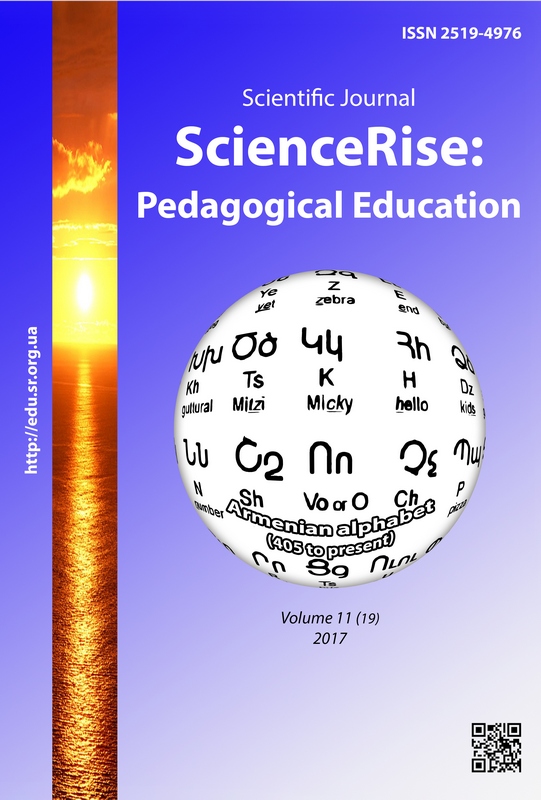Формування комунікативної компетентності студентів технічних ВНЗ у процесі навчання іноземної мови
DOI:
https://doi.org/10.15587/2519-4984.2017.116027Ключові слова:
навчання іноземної мови, комунікативна компетентність, професійне спрямування, іншомовна комунікація, особистісно-орієнтований підхідАнотація
У статті висвітлено концептуальні положення лінгводидактики, що сприяють вдосконаленню процесу формування комунікативної компетентності студентів вищих технічних навчальних закладів. Особливої уваги приділено аналізу сутності і структури іншомовної комунікативної компетентності студентів. Обґрунтовано місце і роль провідних блоків іншомовних здібностей студентів, а також специфіку різних типів оволодіння іноземною мовою (комунікативного і лінгвістичного) професійного спрямування з врахуванням їх мотивації
Посилання
- Vygotskiy, L. S.; Davydov, V. V. (Ed.) (1991). Pedagogicheskaya psikhologiya. Moscow: Pedagogika, 480.
- Kondrashova, L. V. (2007). Protsess obucheniya v vysshey shkole. Krivoy Rog: KGPU, 318.
- Metodika prepodavaniya inostrannykh yazykov v vuze. Inostrannyye yazyki na nespetsialnykh fakultetakh (1978). Leningrad, 1, 197.
- Tkach, M. V. (2005). Do pitannya pro kreditno-modulnu sistemu v navchannі: іnozemnі movi. Nauka і osvіta, 7-8, 76–78.
- Izarenkov, D. I. (1990). Bazisnyye sostavlyayushchiye kommunikativnoy kompetentsii i ikh formirovaniye na prodvinutom etape obucheniya studentov-nefilologov. Russkiy yazyk za rubezhom, 4, 54–60.
- Kabardov, M. K. (1996). Tipy yazykovykh i kommunikativnykh sposobnostey i kompetentsiy. Voprosy psikhologii, 1, 34–50.
- Tovazhnianskyi, L., Romanovskyi, O., Ponomarov, O. (2002). Osobystisno oriientovane proektuvannia systemy pidhotovky natsionalnoi humanitarno-tekhnichnoi elity. Pedahohika i psykholohiia profesiinoi osvity, 3, 40–46.
- Gez, N. I. (1985). Formirovaniye kommunikativnoy kompetentsii kak obyekt zarubezhnykh metodicheskikh issledovaniy. Inostrannyye yazyki v shkole, 2, 17–24.
- Kasianova, V. G. (1995). Psikhologicheskiye osnovy formirovaniya professionalnykh inoyazychnykh umeniy u studentov ekonomicheskikh spetsialnostey vuzov. Moscow, 24.
- Oleksenko, V. (2004). Efektyvni shliakhy vdoskonalennia zmistu i form pidhotovky spetsialista VNZ. Vyshcha osvita Ukrainy, 2, 66–70.
##submission.downloads##
Опубліковано
Як цитувати
Номер
Розділ
Ліцензія
Авторське право (c) 2017 Tetiana Kartel, Hanna Syvokin

Ця робота ліцензується відповідно до Creative Commons Attribution 4.0 International License.
Наше видання використовує положення про авторські права Creative Commons CC BY для журналів відкритого доступу.
Автори, які публікуються у цьому журналі, погоджуються з наступними умовами:
1. Автори залишають за собою право на авторство своєї роботи та передають журналу право першої публікації цієї роботи на умовах ліцензії Creative Commons CC BY, котра дозволяє іншим особам вільно розповсюджувати опубліковану роботу з обов'язковим посиланням на авторів оригінальної роботи та першу публікацію роботи у цьому журналі.
2. Автори мають право укладати самостійні додаткові угоди щодо неексклюзивного розповсюдження роботи у тому вигляді, в якому вона була опублікована цим журналом (наприклад, розміщувати роботу в електронному сховищі установи або публікувати у складі монографії), за умови збереження посилання на першу публікацію роботи у цьому журналі.









